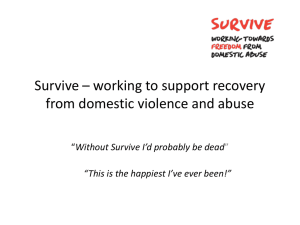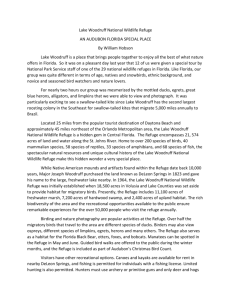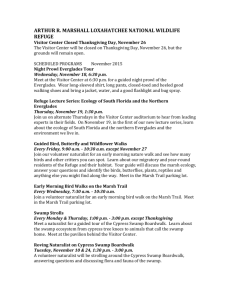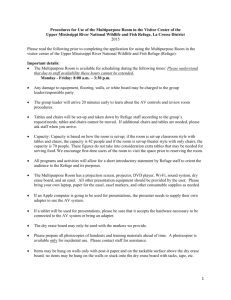Friends of the Wichitae Mountains Written Testimony
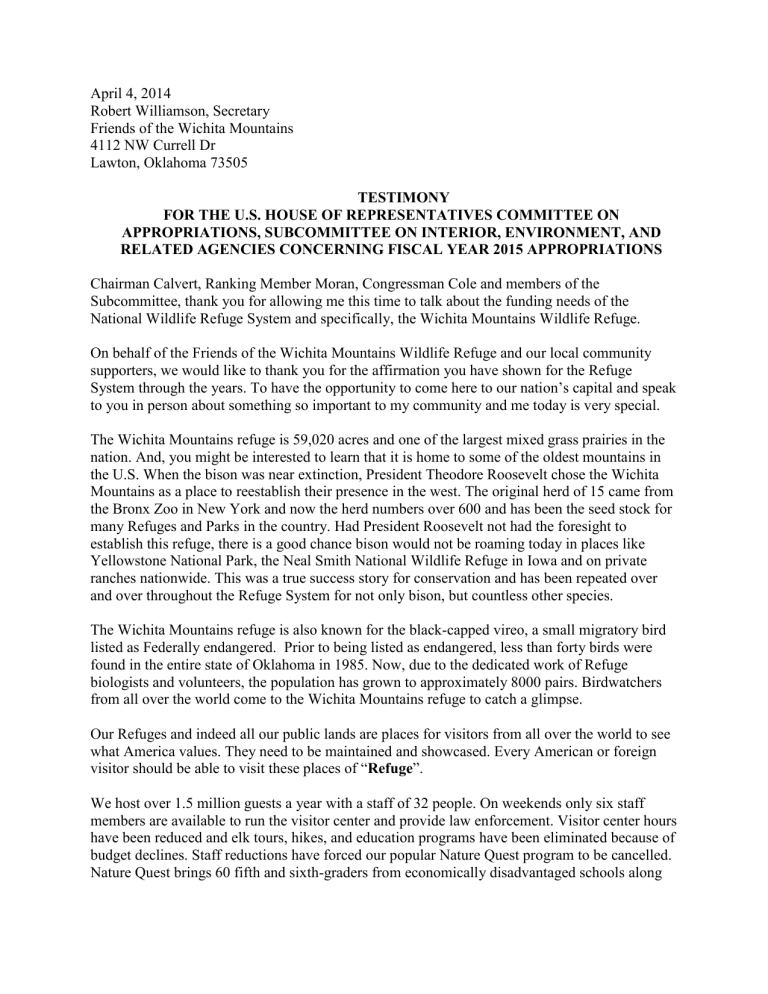
April 4, 2014
Robert Williamson, Secretary
Friends of the Wichita Mountains
4112 NW Currell Dr
Lawton, Oklahoma 73505
TESTIMONY
FOR THE U.S. HOUSE OF REPRESENTATIVES COMMITTEE ON
APPROPRIATIONS, SUBCOMMITTEE ON INTERIOR, ENVIRONMENT, AND
RELATED AGENCIES CONCERNING FISCAL YEAR 2015 APPROPRIATIONS
Chairman Calvert, Ranking Member Moran, Congressman Cole and members of the
Subcommittee, thank you for allowing me this time to talk about the funding needs of the
National Wildlife Refuge System and specifically, the Wichita Mountains Wildlife Refuge.
On behalf of the Friends of the Wichita Mountains Wildlife Refuge and our local community supporters, we would like to thank you for the affirmation you have shown for the Refuge
System through the years. To have the opportunity to come here to our nation’s capital and speak to you in person about something so important to my community and me today is very special.
The Wichita Mountains refuge is 59,020 acres and one of the largest mixed grass prairies in the nation. And, you might be interested to learn that it is home to some of the oldest mountains in the U.S. When the bison was near extinction, President Theodore Roosevelt chose the Wichita
Mountains as a place to reestablish their presence in the west. The original herd of 15 came from the Bronx Zoo in New York and now the herd numbers over 600 and has been the seed stock for many Refuges and Parks in the country. Had President Roosevelt not had the foresight to establish this refuge, there is a good chance bison would not be roaming today in places like
Yellowstone National Park, the Neal Smith National Wildlife Refuge in Iowa and on private ranches nationwide. This was a true success story for conservation and has been repeated over and over throughout the Refuge System for not only bison, but countless other species.
The Wichita Mountains refuge is also known for the black-capped vireo, a small migratory bird listed as Federally endangered. Prior to being listed as endangered, less than forty birds were found in the entire state of Oklahoma in 1985. Now, due to the dedicated work of Refuge biologists and volunteers, the population has grown to approximately 8000 pairs. Birdwatchers from all over the world come to the Wichita Mountains refuge to catch a glimpse.
Our Refuges and indeed all our public lands are places for visitors from all over the world to see what America values. They need to be maintained and showcased. Every American or foreign visitor should be able to visit these places of “
Refuge
”.
We host over 1.5 million guests a year with a staff of 32 people. On weekends only six staff members are available to run the visitor center and provide law enforcement. Visitor center hours have been reduced and elk tours, hikes, and education programs have been eliminated because of budget declines. Staff reductions have forced our popular Nature Quest program to be cancelled.
Nature Quest brings 60 fifth and sixth-graders from economically disadvantaged schools along
with 20 high school student mentors for a weeklong outdoors experience on the refuge. While the Friends and others are willing to fund the program there is no staff to run it.
Our Refuge staff has been doing without for several years. They saw the writing on the wall and tightened their belts. Watch every nickel they spend. Don’t fill a slot when it is created through attrition. Be ready for cutbacks. And they have done without. We have lost biologists, law enforcement, and maintenance personnel. These men and women are a model for government efficiency. They watch every dollar they spend and prioritize what they need.
Our Parks, Monuments, Forests, and Refuges are discretionary spending - I get that. But they also are a source of revenue for this country. Refuges generate over $2.4 billion dollars each year and are funded at only $472 million. Like our military bases, our local communities rely on revenue generated by the people coming to our Refuge.
These visitors eat in our local restaurants, fill up at our local gas stations, stay in our local hotels and all that amounts to a huge economic impact. According to a report released last October –
Banking On Nature - for every $1 Congress appropriates to run the Wichita Mountains NWR, the economic return in our community is $44.57. Quite literally, this refuge is a huge economic asset to our community. I have included an Infographic showing these economic impacts.
We fear that declining budget threaten this economic return. Budget cutbacks have reduced refuge staffing by 10%. The smaller staff is not able to keep abreast of the ever-increasing maintenance backlog. For example staff cannot regularly inspect and maintain the 107 concrete and earthen dams on the refuge or maintain the 32 bathrooms. The reduced maintenance is causing the concessionaire, operating one of our two campgrounds, to lose income, which means their payment of 5% of the gross income to the Refuge is reduced.
Eighty percent of the 50 miles of paved and unpaved roads open to the public are in poor condition and in need of repair. We are looking at alternative transportation methods to improve air quality and reduce infrastructure needs and maintenance expenses. A transportation study is ongoing in our Refuge with the local and state Transportation Authority to promote biking or even shuttles in the Refuge between key points of interest and trail heads.
While campers and other visitors initially come to see the wildlife, many keep coming back for the opportunity to be a part of these conservation success stories. They come to the Refuge and they volunteer. To be a part of this giving back experience is one of the most rewarding things people have ever done. As long as these projects are funded and the staff has the backing they need to support these projects the local communities will support them.
I am one of these volunteers. Our Refuge is over a hundred years old and has not only provided habitat for wildlife, but it’s also been there where our nation needed it most. During the great
Depression when millions of Americans went to work at CCC camps throughout our Parks,
Monuments, Forests, and Wildlife Refuges, we had 3 such camps. American families made it through this time and created many national treasures in doing so. Today those same Parks and
Refuges provide a place for people to go and detach from everyday business, think about their life direction, or maybe just simply unplug from the outside world.
Today more than ever they need these places of “ Refuge ”. Our communities are staying closer to home in today’s economic times. They came in the tens of thousands (20,000 to 30,000) on the weekends last October only to find the refuge closed. Many did not understand. Just because the government is closed why would we be? They need these places to remind them how great we have it.
A number of these hardworking Americans are volunteering – they are doing all they can to assist through volunteering time, raising money, and appearing here today. We are teachers, factory workers, farmers, and numerous other backgrounds. In fact, nationwide, volunteers like myself boost the workforce of the Refuge System by over 20% every year – that’s the equivalent of an additional 702 full time staff across the country. At Wichita Mountains, we contribute the equivalent of ten full time employees. We try the best we can but we are not enough to fill all the growing needs of the Refuge and unfortunately, budget cuts can actually make it impossible for people to volunteer because there is no one to oversee them. But we keep trying. We are a temporary fix by volunteering limited hours each week. The Refuge makes good use of our time but they are not sure they can get enough volunteers every time there is a need – or if they will have the staff to provide necessary oversight. This makes it hard to plan out projects of any size and sadly, a waste of patriotic Americans who just want to give back.
Volunteering can be a stepping-stone to a career. FWS provides so many career opportunities for our youth in biology, animal management, visitor services, fire management, and other fields.
Better our children grow up playing in the streams than in the streets or in front of the TV playing games. Just by getting our children outdoors we can work to reduce obesity, improve their health through projects, or just take a hike and learn about what our grandparents went through to make all this available to them today.
Our Parks and Refuges are an investment in our future, our children’s future, and generations to come. They are our finest gems and should be protected. When hikers meet on the trail they are equals, rich or poor they have a common love for the outdoors and that’s a good thing.
We ask you to make the follow investment in the Refuge System that is a treasure that benefits current and future generations of Americans.
1.
Fully fund the National Wildlife Refuge System at $900 million annually for operations and maintenance, beginning with $480.4 million in FY15;
2.
Increase appropriations for essential conservation programs including State Wildlife
Grants, the Neotropical Migratory Bird Conservation Fund, the Multinational Species
Conservation Fund, Coastal Grants, and the Department of Interior’s Fire Management
Program; and
3.
Pass a Transportation Bill that includes $100 million annually to improve refuge road infrastructure for 46.5 million visitors.
I thank you for this opportunity to provide testimony to this committee - it is a great privilege.
Sincerely,
Robert Williamson
Friends of the Wichita Mountains
